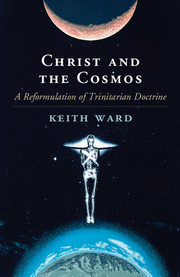Book contents
- Frontmatter
- Contents
- Preface
- Acknowledgements
- PART I THE THREEFOLD NATURE OF THE DIVINE BEING
- PART II THE BIBLICAL SOURCES OF TRINITARIAN THOUGHT
- PART III THE TRINITY, IMMANENT AND ECONOMIC
- 11 Why Three?
- 12 The Trinity and Revelation
- 13 Hegel and Modern Theology
- 14 The Immanent Trinity
- 15 The Identity of the Immanent and the Economic Trinity
- 16 Hegel Again
- 17 What Creation Adds to the Trinity
- 18 The Epistemic Priority of the Economic Trinity
- 19 The Trinity and Naive Realism
- 20 The Trinity and the Cosmos
- 21 Revelation and the Immanent Trinity
- PART IV THE SOCIAL TRINITY
- PART V THE COSMIC TRINITY
- Bibliography
- Subject Index
- Name Index
17 - What Creation Adds to the Trinity
from PART III - THE TRINITY, IMMANENT AND ECONOMIC
Published online by Cambridge University Press: 05 September 2015
- Frontmatter
- Contents
- Preface
- Acknowledgements
- PART I THE THREEFOLD NATURE OF THE DIVINE BEING
- PART II THE BIBLICAL SOURCES OF TRINITARIAN THOUGHT
- PART III THE TRINITY, IMMANENT AND ECONOMIC
- 11 Why Three?
- 12 The Trinity and Revelation
- 13 Hegel and Modern Theology
- 14 The Immanent Trinity
- 15 The Identity of the Immanent and the Economic Trinity
- 16 Hegel Again
- 17 What Creation Adds to the Trinity
- 18 The Epistemic Priority of the Economic Trinity
- 19 The Trinity and Naive Realism
- 20 The Trinity and the Cosmos
- 21 Revelation and the Immanent Trinity
- PART IV THE SOCIAL TRINITY
- PART V THE COSMIC TRINITY
- Bibliography
- Subject Index
- Name Index
Summary
My argument thus far implies that the existence of an economic Trinity, which entails the existence of a created world, adds something to, and actually changes, the being of God. It enables us to see God as contingent and creatively free in actualising ideals of goodness for this cosmos and in bringing into being finite, cooperative creators and contemplators of new values. In this way, this cosmos generates new values of relational creativity which logically could not exist in God alone. The creation of a universe will change God and add something quite new to a postulated immanent Trinity – a God without creation.
This supposal is based on what I take to be the distinctive insight of Christian faith that the union or communion of the created order and the divine is the distinctive purpose and goal of creation. God creates the cosmos and gives it creative autonomy as conscious agents emerge within it, and as such becomes ‘Father of the Universe’. God is manifested on the planet earth in the particular form of the fully human person of Jesus, and as such becomes ‘Son of the Father’. This is a focal and decisive moment in the process of uniting finite human beings and the divine, a process which is carried through by the Spirit.
Seeing God as Trinity in this way involves belief in, and is in fact a way of formulating, the cosmic goal of union between finite persons and the divine. And it implies a specific view of the personal nature of God. Because of Jesus’ peculiarly intimate relationship with the creator, God is known as his ‘Father’. God is thus not seen as a remote and rather impersonal reality (a Platonic ‘Form of the Good’ or even the Thomist ‘Pure Form of Subsistent Being’). God is responsive and interactive in a personal way and possesses the divine being in relation to the ‘other’ of created personhood.
- Type
- Chapter
- Information
- Christ and the CosmosA Reformulation of Trinitarian Doctrine, pp. 116 - 119Publisher: Cambridge University PressPrint publication year: 2015



